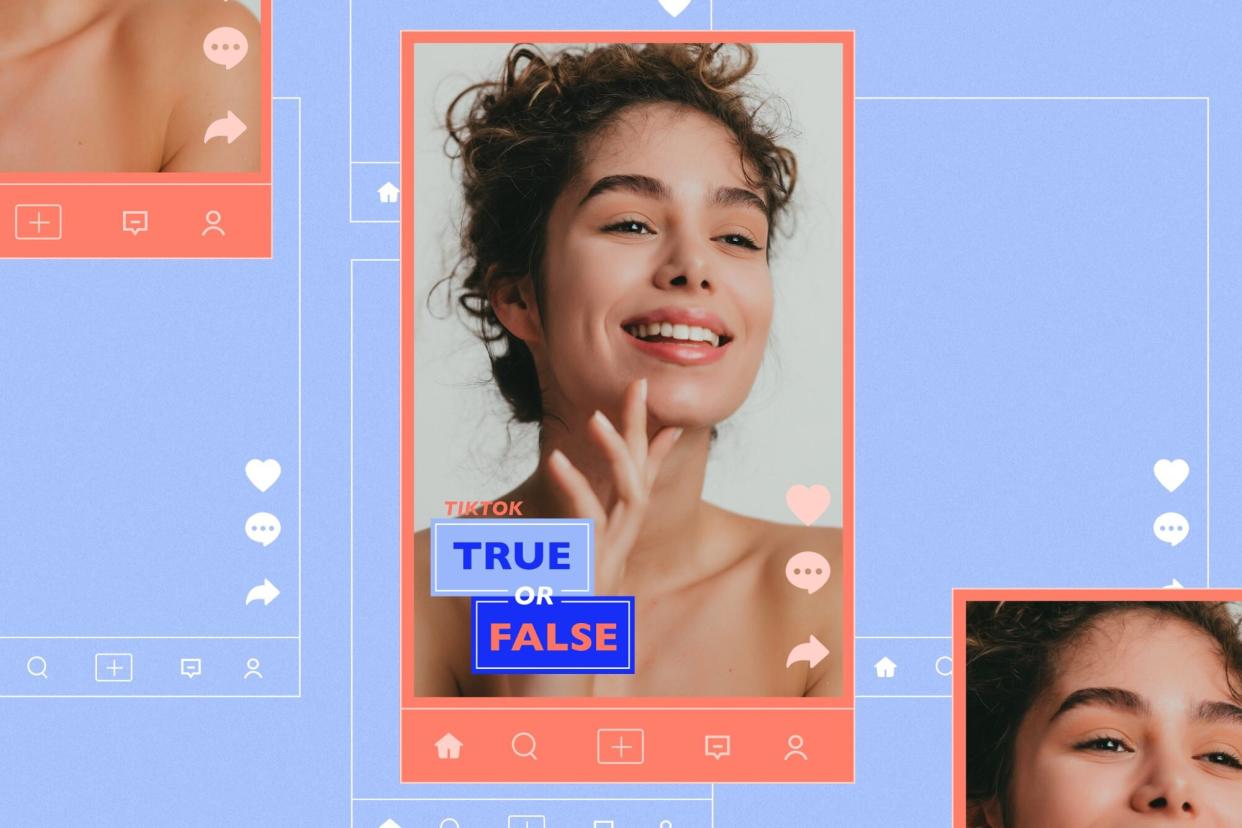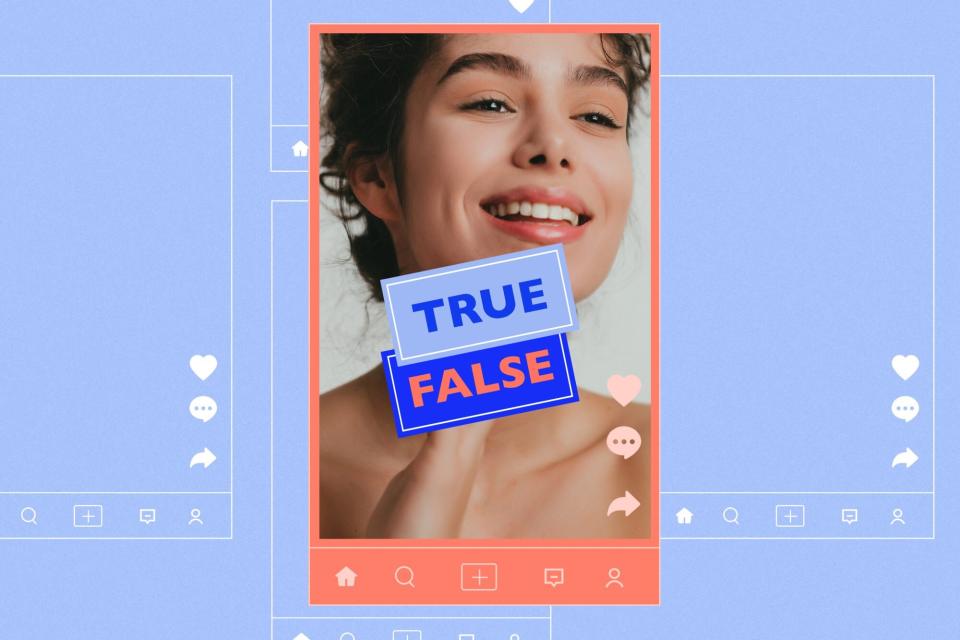Skin Fasting Is the Latest TikTok Skin-Care Hack, But Does It Work?

Getty Images
TABLE OF CONTENTS
On This Page
What is skin-care fasting?
Does skin-care fasting work?
Is skin-care fasting safe?
Doing a skin-care fast is good for your skin: true or false?
TikTok True or False is the answer to your burning questions about the health, beauty, and fitness fads taking over your social feeds. Each story breaks down a buzzy wellness trend with the help of experts and scientific research to uncover the truth and safety behind the viral "advice" you see online. You'll never have to wonder what's actually legit — or what to skip — again.
Whether it's using Preparation H as an under-eye cream, taping your skin before bed to prevent wrinkles, or rubbing Pepto-Bismol on your skin for a clear complexion, there's always something related to skin care floating around on TikTok. But the latest trend to hit the popular social media app doesn't involve adding anything to your skin-care routine. Instead, it's all about paring it back. Enter: skin-care fasting.
The concept of taking a break from using certain skin-care products, specifically those with harsh ingredients, such as retinol and acids, is nothing new. Still, information about putting a pause on and/or minimizing your skin-care routine is swirling on TikTok, and it's been neatly repackaged as skin fasting.
Case in point, Maliha Ihenacho (a skin-care esthetician and trichology student, according to her TikTok bio) posted a video explaining the trend, and it has racked up over 70,000 views. In the clip, Ihenacho suggests followers take a break from using skin-care products, noting "some slowly eliminate products, while others go cold turkey," in her caption. For a "complete" skin-care fast, you'll need to stop using everything, including cleansers, moisturizers, serums, and any other regulars in your lineup for 24 hours (she does this once or twice a week). The theory is that with no products on your skin, its natural sebum handles the task of balancing and protecting it, claims Ihenacho in the caption of her post.
For those who've built up a lengthy skin-care routine, this might seem like an impossible task, but Ihenacho swears by skin-care fasting. "This will strengthen the skin's natural protective barrier and is a great way to determine products that are causing irritation, breakouts, and other skin-care issues," says Ihenancho in her popular TikTok. However, those with skin conditions, such as eczema and rosacea, and those using prescription skin-care products shouldn't pause using necessary products, she writes in her caption. Not using sunscreen is also a risk, especially if you've recently applied retinol to the skin, she notes.
Ihenacho isn't the only TikTok user talking about skin fasting. Videos tagged with #skincarefasting collectively have more than 350,000 views, and dozens of other creators have popped up to share more information about the practice. But is it really necessary to take a temporary break from your skin-care regimen, and how much good can skin fasting really do?
Dermatologists agree that weekly skin-care fasting isn't entirely beneficial. However, there is some merit to the idea that you should take regular breaks from using certain products that contain especially potent ingredients, such as retinoids. Ahead, learn more from board-certified dermatologists about what skin fasting is and whether or not it's safe.
What is skin-care fasting?
Skin-care fasting involves taking a break from using all or non-essential skin-care products with the goal of allowing the skin to reset itself and strengthen the skin's natural protective barrier (aka the outermost layer of skin that protects it from pollution, bacteria, and irritation). That said, how often and how long you stop using products should vary based on the individual and their skin-care needs, according to Naana Boakye, M.D., M.P.H., founder of Bergen Dermatology.
"I think the concept of skin fasting was likely born because of overuse of active ingredients, like retinoids and exfoliating acids. When you try to push the workhorses (the exfoliating acids and the retinoids) by using them every single day, you're damaging your skin barrier (the body's outermost line of defense in protecting itself from harmful toxins and germs)," says Whitney Bowe, M.D., board-certified dermatologist and founder of DWB. "This sets your skin up for a state of chronic, low grade inflammation that can make your skin sensitive and more prone to breakouts and skin aging." That's why taking a break from products containing those ingredients may be helpful.
Does skin-care fasting work?
While some TikTokers claim skin fasting is the key to resetting the skin's barrier and promoting healthy skin, it really "isn't necessary or beneficial" and can potentially cause more harm than good, says Dr. Bowe. "Choosing not to cleanse your skin with a gentle, pH-balanced cleanser in the evening can lead to breakouts in acne-prone skin. Your skin is still 'facing' the day, whether you are using nourishing ingredients or not, and in the evening, your skin will have accumulated dirt, sweat, and pollutants that are adhering to your skin after a full day of exposure to the environment," she says.
However, that's not to say taking a minimalist approach to skin care on a regular basis isn't effective. Instead of skipping all products, consider incorporating recovery nights into your routine, suggests Dr. Bowe. That means intentionally taking a break from using products with active ingredients, such as acids and retinoids, on certain nights with the intention of repairing your skin barrier. On these days, stick to a gentle cleanser, Vitamin C serum, and sunscreen, she says.
Is skin-care fasting safe?
For most people, skin-care fasting itself won't lead to any serious or harmful consequences; however, it can add unnecessary stress on your skin, which you don't want, according to Dr. Bowe. Additionally, if you try skin fasting, it should be done under the guidance of a medical professional, says Dr. Naana. The length of time you stop using skin-care products may need to vary based on the current medications and products you use, she adds.
Doing a skin-care fast is good for your skin: true or false?

Getty Images
Despite claims made on TikTok, you don't necessarily need to take a break from using all skin-care products to let your skin reset. However, you might consider using fewer non-essential products regularly as a form of recovery. "Instead of 'skin fasting,' which I do not recommend, build in 'recovery nights' into your skin-care routine," says Bowe. This way, you allow your skin barrier to recover by taking a brief break from products that contain harsh ingredients, including retinol and acids, but you can still use cleanser, moisturizer, and sunscreen on a daily basis. As always, be sure to consult with your doctor before changing up your skin-care regimen.

